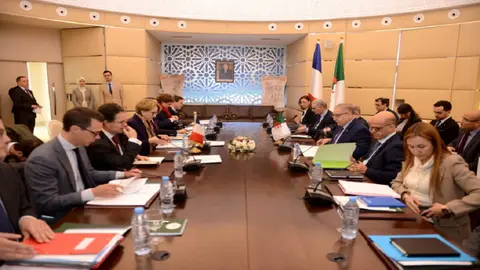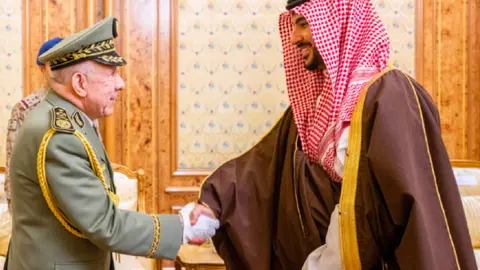Geopolitics of ingratitude

The drift of the military-political power, Tebboune-Chengriha, has been marked since the country's creation in 1962. This was the moment when Algeria, in addition to embracing communism, adopted the ideology of tabula rasa and worshipped ingratitude towards Morocco, which had sacrificed so much for independence.
Back in 1884, Sultan Mulay Abderraman unconditionally supported Abdelkader, an insurrectionist nicknamed the Emir, who fought against the French occupation and ended up taking refuge in Morocco. Not content, the Gauls provoked the Battle of Isly. The defeat inflicted led to the signing of the Treaty of Maghnia (1845), by which France annexed Moroccan territories to its Algerian Department which, years later, it would extend with the occupation of areas of Bechar, Tuat and Eastern Sahara. This weakening of the sultanate would later bring with it the French protectorate, which it would later share with Spain by ceding Rio de Oro (Sakia al-Hamra), south of Tarfaya.
But Moroccan support continued under the late King Mohammed V, who refused France's offer in 1956 to return the annexed territories if it stopped supporting the FLN (Algerian National Liberation Front), which had its headquarters in the Moroccan border town of Oujda, with weapons and ammunition workshops. When the proposal was rejected, the late Hassan II agreed in July 1961 with the provisional head of the future Republic of Algeria, Ferhat Abbas, to return them when it gained independence. Meanwhile, de Gaulle claimed that "since the beginning of time, there has never been a (political) entity, nor a strong reason for Algeria's sovereignty". In fact, this Berber region was Phoenician and Roman in ancient times; it also belonged to Morocco's Cherifian Empire, the Ottoman Empire and France.
King Mohammed V (1957) and King Hassan II (1961) both addressed the UN General Assembly and, from the top of the podium, defended Algeria's independence. This contrasts with the speech by Tebboune (19-09-23) who, from the same podium, called for the amputation of the sovereignty of the Kingdom of Morocco over its Southern Provinces.
Moreover, Morocco, which had used football to support Algeria, was sanctioned by FIFA in 1958 for having played several matches with the FLN as a sign of its unwavering support for the Algerian cause; today this country is using it to prevent participation in the CAN 2022 by closing its airspace to the Moroccan national team. As if that were not enough, at the recent CAN 2024 in Côte d'Ivoire, Algerian fans burned the Moroccan team's jersey and celebrated en masse in the streets of Algiers after their elimination in the round of 16. The strange thing is that the Algerian military dictatorship had banned all human gatherings for years for fear of Hirak. In fact, even the demonstration against Israel for the genocide in Gaza and the celebration of its 5th anniversary on 22 February were not allowed.
It is worth noting that in the early days of Algerian independence there was an entente, Morocco-Algeria, which augured a united and prosperous Arab Maghreb, once the French coloniser had been expelled. However, the turning point came with the departure of Ferhat Abbas when he saw Ben Bela (who would declare that the inherited borders were a "gift from France") throw himself into the arms of the Soviet, and then the coup leader Boumediane would install the criminal caste that today rules a country that has become the laughing stock of the Arab world.
The fact is that Morocco has still not recovered its territories despite the War of the Sands (1963) in which the Algerian army, supported by Egypt and Cuba, was humiliated in the words of the president in command himself, and later from the mouths of Boumediene himself and Bouteflika, and the rest is bad fiction. The Moroccan army arrived 10 km from Tindouf and, to the north, in an advanced position 80 km in the direction of Algiers. This advance was interrupted by the ceasefire signed in Bamako, the capital of Mali. Mali has just broken off relations with Algeria, accusing it of promoting terrorism in the Sahel.
Algeria's ill-fated diplomatic policy is provoking geopolitical crises with its neighbours and beyond. With France, permanently; with Spain, with the United Arab Emirates (UAE), with Saudi Arabia, which has just banned any reference to Western Sahara as "Moroccan", as well as any incomplete map of the Kingdom. The Algerian dictatorship is at odds with the entire Sahel (linked to King Mohammed VI's transatlantic project), Egypt, Libya, Congo, Sierra Leone, Côte d'Ivoire, the United States, etc.
Its manifest disloyalty in closing the Maghreb-Europe gas pipeline in the midst of the war in Ukraine, for no economic-financial reason, but out of hatred for its neighbour, the Algerian dictatorship lost, in addition to international confidence, the trans-African gas pipeline to Morocco. Indeed, the Algerian press is now vilifying Nigeria and Niger and anyone who deals with Morocco.
The country thus totals a serious geopolitical balance sheet that can be summed up as regional isolation, from the Arab world, from ECOWAS, from the Sahel countries, and even from its own allies (Russia and China) because of its irrelevance on the international stage. Today, Algeria has become a destabilising entity on the African continent, to which it contributes nothing. Reasons enough for it to be unceremoniously rejected by the BRICS group, in addition to being an unproductive country that only lives off gas revenues.
With its diplomacy in tatters, the Algerian mafia is preparing for more defeats, such as the withdrawal of the Sahara dossier from the UN's Fourth Commission and the expulsion of the ghostly Polisario Republic from the African Union. Aware of this, it is trying to survive its own catastrophe by involving South Africa; a country that has recently put De Mistura in a serious bind.
South Africa is another ungrateful country that, since 2005, has been going hand in hand with the Algerian dictatorship. It is located in southern Africa and is made up of nine provinces, one of which, the Western Cape, with its aboriginal "Xhosa" language, has for years been calling for a referendum on independence, as has Algerian-occupied Kabylia. South Africa suffered centuries of European colonisation that culminated in an iron-fisted apartheid and the imprisonment of Mandela, who later became the country's first black president. On his first anniversary as president, Mandela highlighted in his speech (1994) the late King Hassan II's tireless support for the anti-Apartheid cause, noting his generosity in arming and funding South African fighters and whom he regarded as one of the "architects of the South African Army". In Mandela's words, "Rabat was the crossroads of almost every liberation movement on the continent, Mozambique, Angola or Cape Verde and Algeria".
In the long struggle for Algerian independence, Morocco used every means at its disposal. It was its political, financial and military support, which is now part of Algeria's recent history, however much it may trouble its rulers, who insist on forgetting how much they owe to the great Kingdom of Morocco. There was no need to remind them, but their unhealthy hatred of Morocco more than justifies it. Their ingratitude, fleeing forward, has led the country from crisis to crisis and from provocation to provocation, plunging it into permanent chaos.
Anyone who follows in its wake is doomed to cataclysm. And if anyone believes that the country of the military has reached rock bottom, they are mistaken. To paraphrase the witty phrase from Mediaset's "La que se avecina", I would say that in the basement of Algeria's failures there is always one more plant towards self-destruction.
We know that the world is full of ungrateful people, but never has ingratitude conditioned the regional geopolitics and governance of a country incapable of reversing its tragedy by investing in its industrialisation with a view to economic development and regional integration.



